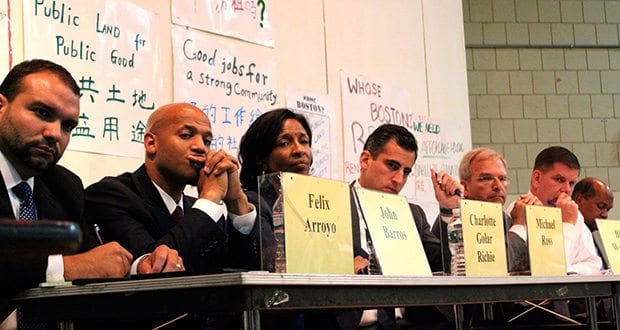
The affordable housing activists gathered at the Quincy School last week at a mayoral candidates forum were asked some of the most vexing questions facing policy makers involving residential development.
The candidates were asked how they would stop the displacement of low-income residents in newly fashionable neighborhoods; how they would prevent foreclosures and no-fault evictions; and how they would balance luxury developments with affordable housing.
The forum was sponsored by the umbrella groups Right to the City Boston and the Boston Tenant Coalition.
The mayoral candidates who met with the groups — John Barros, Felix Arroyo, Charlotte Golar Richie, Michael Ross, Bill Walczak, Charles Yancey and Marty Walsh — expressed strong support for public housing, tenant protections, the preservation and construction of public housing units and housing for the homeless.
Where they demonstrated their differences was in the experience each said they would bring to bear in tackling these issues as mayor.
City Councilor Arroyo talked about his family coming to Boston from Puerto Rico and living in public housing in the Villa Victoria public housing development and cited his work on the City Council on behalf of affordable housing initiatives.
Richie, a former state representative, talked about her parents work in public housing in New York City, where she grew up, and touted her experience as head of Boston’s Department of Neighborhood Development.
Barros touted his work as executive director of the Dudley Street Neighborhood Initiative, which has taken land by eminent domain and held it in trust for the development of affordable housing.
Walsh spoke about the displacement of long-time residents in the Savin Hill neighborhood where he grew up and lives and how it informed his support for affordable housing.
The candidates offered no positions at odds with those espoused by the groups that organized the forum, which included City Life/Vida Urbana, the Chinese Progressive Association, the Mass Alliance of HUD Tenants and the Mass Senior Action Council.
When asked what they would do to end homelessness in Boston, the candidates’ answers varied greatly.
Ross suggested shifting some resources from shelters to actual housing units for homeless people, regardless of whether or not they’re sober, arguing it’s easier for people to receive services when they have a place to stay.
“When you’re homeless, what you need is a home,” he said.
Yancey said he would float a special bond issue to build more housing units for homeless people.
“When I was born there were 800,000 people living in Boston,” he said. “Now we have a little more than 600,000. There’s still room in Boston.”
Arroyo said a third of all housing should be affordable and one third should be moderately affordable.
When asked what they would do to stop banks from evicting tenants after foreclosure, virtually all of the candidates agreed with the coalition’s suggested measure, which include fining banks that don’t mediate, taking city deposits out of Wall Street banks, and using eminent domain to take mortgages and renegotiate them.
Richie cited her eight years as head of the city’s Department of Neighborhood Development, which launched a “Don’t Borrow Trouble” public awareness campaign to help steer homeowners away from predatory loans. She also said she would use the mayor’s office as a bully pulpit to force banks to do right by homeowners.
Walsh agreed with the group’s measures.
“The federal government shouldn’t have given [banks] money to keep their doors open so they could shut your doors,” he said.
Yancey agreed with the group’s ideas and noted that he’s attended City Life’s eviction blockades, actions designed to disrupt foreclosure auctions and force banks to negotiate with homeowners in default.
Arroyo also cited his attendance at the blockades, noted that he’s intervened by phoning banks on behalf of homeowners and gone to housing court with homeowners seeking to halt foreclosures.
“I’ve been there with you at the court house,” he said.
Arroyo also noted that he wrote legislation that would require the city to deposit the more than $1 billion in cash it holds in banks that invest in local communities, rather than in Wall Street banks.
Barros agreed with the group’s suggestions and said he’s had experience using eminent domain to renegotiate mortgages. The Dudley Street Neighborhood Initiative was given the power of eminent domain by the city in the 1980s to take vacant land from speculators and hold it in a community land trust.
The seven mayoral candidates present at the forum were among the most progressive in the race. Most of them, with the exception of Ross, have not received significant contributions from real estate developers and large financial institutions.
Unable to attend were Suffolk District Attorney Dan Conley, Boston City Councilors John Connelly and Rob Consalvo, radio host Charles Clemmons and David James Wyatt.






